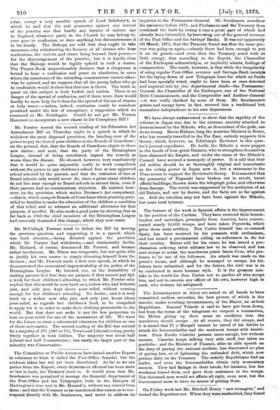Mr. M'Cullagh Torrens tried to defeat the Bill by moving
the previous question, and supporting it in a speech which was both obsolete, —being directed against the provision which Mr. Forster had withdrawn,—and intrinsically feeble. Mr. Richard, of course, denounced Mr. Forster, and became rather incoherent. Mr. Dixon was temperate, but not quite able to justify his own course in simply absenting himself from the division ; and Mr. Fawcett made a first-rate speech, in which he demonstrated the economical impracticability of the policy of the Birmingham League. He insisted, too, on the desirability of making parents feel that they are paupers if they cannot pay 24.d. a week for their children's schooling, to which Mr. Forster only replied that this would be very hard on a widow who had hitherto just, and only just, kept above poor-relief, without earning enough for her children's schooling. No doubt ; and it is very hard on a widow now who just, and only just, keeps above poor-relief, as regards her children's food, to be compelled to apply for it in order to make their clothing presentable to the world. But that does not make it any the less pauperism to lean on poor-relief for one of the necessaries of life. We want for the future to treat a substantial education for children as one of those necessaries. The second reading of the Bill was carried by a majority of 271 (343 to 72), Tories and Liberals voting pretty freely together in both lobbies. The majority was about half Liberal and half Conservative ; but vastly the larger part of the minority was Conservative.


































 Previous page
Previous page